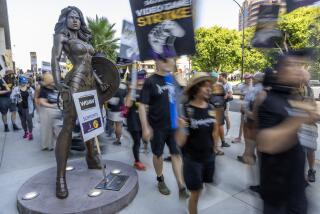Why We Actors Are Staging a Strike
- Share via
When an author publishes a book or a composer publishes a song, they get paid royalties. The more copies that are sold, the more money they make. It’s a basic method of determining market value for creative work. Since 1953, actors and performers in TV commercials have been compensated much the same way with “residuals.” Each time a spot runs on broadcast television, performers earn residuals. If your spot is a flop, you don’t make very much. If you become a household name, like Mr. Whipple or Joe Isuzu, you can make a decent living.
Since May 1, the Screen Actors Guild and the American Federation of Television and Radio Artists have been on strike because advertisers want to abolish the system of paying residuals to performers. They want to pay actors a flat fee for their performances in all ads. That’s wrong. And actors from the well-known to the unknown won’t stand for it.
Commercial actors are unique among creative artists; their earning potential is inherently restricted. The more successful they are, the more difficult it becomes to get work. Mr. Whipple could be the spokesman for Charmin. By contract, he couldn’t represent any other bathroom tissue manufacturer. In fact, he would have trouble getting hired to represent other major manufacturers because he would be “overexposed.” The public knows him as kindly old Mr. Whipple, so other companies don’t want to cast him in a different role.
By abolishing the principle of paying residuals, advertisers want to strike at the very core of a performers’ creative control--control over how your image is used. They want to pay a flat fee and say goodbye, free to use our images not only on television, but in print, on the Internet and in other media that haven’t even been commercialized yet. A flat-fee structure would allow them to reshape, remold, reconfigure images and advertisements with virtually no recourse for actors.
It is curious that this attack on actors’ livelihoods and our union comes at a time when the advertising industry is feeling its oats. Advertising revenue jumped 22% last year alone. The economy is still humming, and advertising is roaring into new arenas with the Internet and other multimedia technologies. Of the $400 billion that is spent on advertising each year, performers’ pay amounts to only 1.4%. That includes the healthy compensation for the superstars like Tiger Woods and Jerry Seinfeld.
So why are advertisers fighting over comparatively little money? Because they are convinced that actors are too disorganized a band of part-time waiters, taxi drivers and administrative assistants to fight effectively. They are wrong.
This strike is now entering its fifth month. Commercial production has been severely curtailed in every major city in the United States. As the strike has dragged on, support from performers has actually strengthened. Over the course of the last two weeks, dozens of high-profile performers, including Paul Newman, Jason Robards and the casts of “Frasier,” “West Wing” and “Malcolm in the Middle,” have made clear the resolve of SAG members from top to bottom. The rest of the labor movement has stood shoulder to shoulder with working actors because in many ways our struggle isn’t all that different from the struggles of other union workers.
Federal mediators have stepped in and will try to help jump-start stalled negotiations on Wednesday. SAG and AFTRA have said repeatedly that we are ready and willing to bargain fairly. We want to settle this strike and get back to work. But we cannot and will not give away the basic principles of value for our creative product and control over our image.
More to Read
The biggest entertainment stories
Get our big stories about Hollywood, film, television, music, arts, culture and more right in your inbox as soon as they publish.
You may occasionally receive promotional content from the Los Angeles Times.










